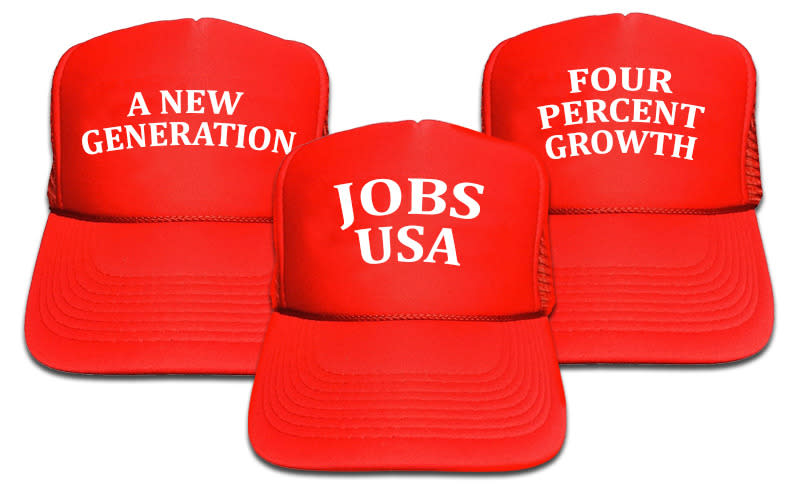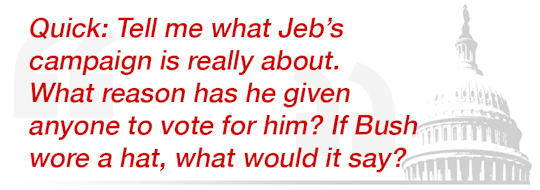Missing from the Republican debate: better hats

Photo illustration: Yahoo News
Watching last night’s Republican debate while the World Series played on another channel brought to mind the late Yogi Berra, who once described the shadows in Yankee Stadium’s left field this way: “It gets late early out there.”
Going into last night’s debate, there was still plenty of time left on the calendar for any of the party’s governing candidates to incite some passion among voters and break away from the second-tier blob. But after months of town halls and diner stops and two previous debates that seemed to last for about 18 hours each, the odds that any one of these candidates might suddenly take flight — especially in New Hampshire, where the establishment will likely need to make its stand — seemed to be growing more remote.
Slideshow: The third GOP debate >>>
It’s getting late early out there. And there’s a palpable sense of anxiety among candidates who wonder why they’re running in place, and how long they have until their window of opportunity starts to close.
I agree with those who thought Marco Rubio had command of the stage last night, dealing a pretty sharp blow to his friend and fading mentor, Jeb Bush. Back in April, after interviewing Rubio on the eve of his announcement, I wrote that he would get a moment like this, and he seems to be seizing it.
But to this point, he and the rest of the party’s governing candidates — Bush, John Kasich, Chris Christie, Rand Paul — have remained, for the most part, bunched together in polls, and probably in the public mind too. And there are reasons for that.
For one thing, the field is so crowded that it’s hard to get the kind of exposure a governor or senator might normally take for granted in the autumn of a primary campaign. When the governors of Ohio and New Jersey have to shout from the edge of the stage just to force their way into a debate (and when other governors and senators can’t even gain admission), it’s no wonder that voters haven’t been able to differentiate much between them.

And then of course there’s the Trump carnival, which dominated coverage for an entire summer, forcing all the other candidates to react. Trump has never held more than a third of the Republican electorate in Iowa or New Hampshire, according to most polls, but he’s commanded about 90 percent of the campaign news from both states.
But none of that really explains the lack of enthusiasm out there for anyone who isn’t a builder or a brain surgeon. None of that gets to the heart of the problem these guys are having — which is what’s missing at the heart of their campaigns.
If I went out on the street in Manchester today and asked 20 random people what Trump’s campaign was about, probably 15 of them would tell me: “Make America great again.” They’ve seen the hat. They’ve heard the 60-second spiel about how America never wins anymore, which always strikes me as the most powerful line of the campaign.
We know what Ben Carson’s big idea is — that only a complete outsider and novice can fix what the experts in Washington have wrought. (“It’s not brain surgery” would be his hat.) We know that Carly Fiorina is going to bring a CEO’s acumen to the White House.
Scoff if you want. Call these empty bumper stickers, which in this case they are. But there’s nothing cheap or shallow about having an actual, overarching argument.
Even now, people remember Ronald Reagan’s “morning in America” as something more than a slogan; it was a reassuring promise at a moment when a lot of Americans thought they were living in twilight. Bill Clinton’s “putting people first” was the rubric under which he literally compiled a book of ideas, all centered on the middle class.
It’s fair to point out that Barack Obama didn’t have any real animating argument for his 2008 candidacy, beyond the banality of “hope and change.” But Obama didn’t need one; by virtue of his race, his age and his story, he embodied the case for cultural change in a way that no book or slogan ever could. This year’s Republicans have no such luxury.
Their appeal has to lie in their rationales for running, the kind of change they represent. And to this point, anyway, you’d be hard pressed to summarize any of their agendas in a way that inspires or captivates anyone.
Oh, sure, they all talk about their records, and that’s a pretty good way to introduce yourself. They’ve all got loads of policy positions. They’re always “rolling out” some new tax plan or some new energy thing, carefully crafted by experts to appeal to editorial pages and guaranteed to go absolutely nowhere.
I’m not saying those policies don’t have merit. I’m just saying that no one should confuse them with an actual rationale.
Quick: Tell me what Jeb’s campaign is really about. What reason has he given anyone to vote for him? If Bush wore a hat, what would it say? “Four percent growth”?
Truth be told, most campaigns don’t start out with their animating themes. They hone them along the way, as they test out different messages and get a sense of what resonates most with voters.
In order to do that, though, you need to speak to a lot of packed rooms, and you need to be able to talk about the things you want to talk about, as opposed to, say, Trump’s Great Wall. I’m not sure any of these candidates have been able to go through the usual process that allows a candidate to find his voice.
But still, you’ve got to think bigger than this. You’ve got to somehow synthesize your vision for the country, or else you’re liable to wake the week after Thanksgiving and find you’re still losing to a megalomaniac with a stupid hat.
I rode around New Hampshire with Kasich a few weeks ago, on the day that he “rolled out” his detailed plan to balance the budget. He seemed a little irritated when I pressed him to explain to me how his vision for the country distinguished him from his rivals.
“Look at what we’ve done!” he told me. “Look at what’s happened in Ohio! These other people like to have — I don’t even know what their plans are. What have they done? What have they achieved? What have they accomplished?”

Kasich ought to have a better answer. In Ohio, he focused almost maniacally on job creation. Even before being sworn in, he drove around the state meeting with CEOs who were considering relocation. He replaced the state’s economic development department with a controversial, private-sector initiative called “Jobs Ohio,” whose singular mission was to lure new employers and keep old ones.
So why isn’t Kasich building a national campaign that’s all about bringing back jobs? Why isn’t he proposing a “Jobs USA” to do the exact same thing in the global market that he claims to have done in the Midwest?
Wouldn’t that be a bigger, more imaginative platform than promising to lower the same taxes that everyone else wants to lower?
Why isn’t Rubio making an explicit case for a generational handover of power? Why isn’t Christie building his campaign around a long-term agenda to reform old government institutions, in the same way he sold painful pension and school reform in his state?
Maybe these aren’t the right arguments for a presidential campaign. Maybe these aren’t the stories that these middling Republican candidates are burning to tell right now.
But this much I know: It’s getting late early this year. And if you want to break out, you’ve got to tell people why.

